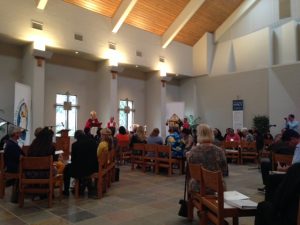 In the diocese of San Diego, we have just concluded our first (and what may be the world’s first) topical diocesan synod. Bishop Robert McElroy announced last May that he would convene the synod. During the summer, delegates were appointed from each parish and listening sessions were held. In early fall, the listening sessions continued and the working group sessions began. Since this is the first time I had ever participated in a diocesan synod, I was sometimes unsure of my role. But I can honestly say that it was a very powerful and Spirit-filled process. It gives me great hope for our church.
In the diocese of San Diego, we have just concluded our first (and what may be the world’s first) topical diocesan synod. Bishop Robert McElroy announced last May that he would convene the synod. During the summer, delegates were appointed from each parish and listening sessions were held. In early fall, the listening sessions continued and the working group sessions began. Since this is the first time I had ever participated in a diocesan synod, I was sometimes unsure of my role. But I can honestly say that it was a very powerful and Spirit-filled process. It gives me great hope for our church.
In the opening prayer of the general assembly on Saturday morning, Bishop McElroy told the delegates that they were not invited to simply reiterate church teaching, but rather to reflect on how we can provide a renewed pastoral application of church teaching to people’s real lives. He reflected on the gospel of Matthew’s description of Mary, Joseph, and the baby Jesus in their flight to Egypt, noting that the holy family provides an icon of the family. Reflecting on the danger the holy family encountered, he said that their faith must have been “shaken” but still they had trust in God. How are we, then, called to trust in the midst of feeling shaken? The Bishop then drew on key themes from Pope Francis as he encouraged delegates to prioritize mercy, to think of the church as a “field hospital” that can meet the immediate needs of hurting families, and to journey with people in the faith, encouraging even small steps.
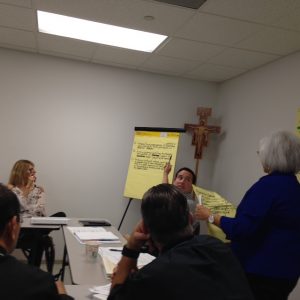 Sr. Tobie Tondi and I were the theologians who accompanied the second challenge working group, whose topic focused on hospitality to young adults and unmarried couples. Sr. Tobie and I hosted listening sessions with undergraduate students, graduate students, and young alumni at the University of San Diego. We also attended the saturday working group session in August and the breakout sessions during the synod this past weekend. The delegates in our group came from different parishes all around San Diego and Imperial counties and spoke from their life experiences, professional experiences, and deep commitment to their faith. Bobbie Espinoza and Patrick Rivera facilitated difficult and wide-ranging discussions, while Kristie Krische had the tough job of recording. Throughout our deliberations and discussions, delegates were able to offer suggestions for how our local church can best implement Amoris Laetitia in a way that responds to the particular needs of our local communities. In our dialogues, we were especially interested in asking ourselves not just how can we meet the needs of the people in the pews, but also how can we reach those who are no longer coming to church? As you can imagine, not everyone was in agreement on all issues or recommendations. We listened, we sought common ground, and we tried to discern a way forward that brought together the insights of everyone in the room. We were encouraged to think creatively and compassionately. We are told to be specific and to give recommendations that were “measurable, achievable, relevant, and timely.” A tall order!
Sr. Tobie Tondi and I were the theologians who accompanied the second challenge working group, whose topic focused on hospitality to young adults and unmarried couples. Sr. Tobie and I hosted listening sessions with undergraduate students, graduate students, and young alumni at the University of San Diego. We also attended the saturday working group session in August and the breakout sessions during the synod this past weekend. The delegates in our group came from different parishes all around San Diego and Imperial counties and spoke from their life experiences, professional experiences, and deep commitment to their faith. Bobbie Espinoza and Patrick Rivera facilitated difficult and wide-ranging discussions, while Kristie Krische had the tough job of recording. Throughout our deliberations and discussions, delegates were able to offer suggestions for how our local church can best implement Amoris Laetitia in a way that responds to the particular needs of our local communities. In our dialogues, we were especially interested in asking ourselves not just how can we meet the needs of the people in the pews, but also how can we reach those who are no longer coming to church? As you can imagine, not everyone was in agreement on all issues or recommendations. We listened, we sought common ground, and we tried to discern a way forward that brought together the insights of everyone in the room. We were encouraged to think creatively and compassionately. We are told to be specific and to give recommendations that were “measurable, achievable, relevant, and timely.” A tall order!
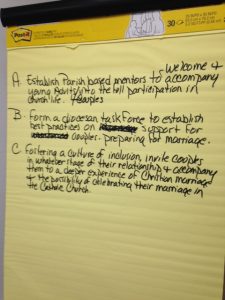 In the general assembly during the synod, each working group received feedback from the whole body. There was time for prayerful reflection, small group discussion, and input in front of the whole body. Participants were chosen because they were leaders in their parish communities, and they represented diverse groups with regard to age, ethnicity, and gender.
In the general assembly during the synod, each working group received feedback from the whole body. There was time for prayerful reflection, small group discussion, and input in front of the whole body. Participants were chosen because they were leaders in their parish communities, and they represented diverse groups with regard to age, ethnicity, and gender.
In my theological reflection to the general assembly on Sunday, I reflected on the messiness of family life, encouraging the delegates to consider how “God blesses our messes.” Here’s some of what I said there:
“Family life can me messy. As it turns out, so can synod discussions of family life.
Sometimes in church we downplay the difficulties and the messiness. For example, the Swanson image of “Flight to Egypt” on our worship aid. I don’t know about all of you mothers out there, but after I gave birth—after the stitches and the hemorrhoids and the sore nipples—all the stuff we aren’t supposed to discuss in polite company—after that experience of the concrete reality of childbirth, I can’t imagine sitting serenely on a donkey for a cross-country journey.
If you’ve ever baked a cake with a three year old, or cleaned up after a teenager’s slumber party, you know that kids are good at making messes.
I think we need to resist any urge to “tidy up” our Synod experience too much.
My first reflection, then, is that God blesses our messes. We heard proclaimed yesterday the infancy narrative from the gospel of Matthew. Luke’s version of the story is no tidier…. There is nothing easy or serene or tidy or silent about the way God entered our world in the incarnation. …God comes in the midst of family life, messy though it is. … Jesus’s ministry to the marginalized in his own day was treated with suspicion. His table fellowship, his welcoming of the other, his willingness to talk to and befriend women. There was nothing “neat and tidy” about Jesus’s ministry and the “unschooled, ordinary” disciples with whom he kept company (Acts 4). And of course, when we consider the way Jesus died, we are challenged to ask ourselves what it means to enter into solidarity with those suffering today, knowing how God redeems us through brokenness. Jesus’s death was messy. We have faith that God transforms humiliation and suffering, that new life can come after grief and death. But that doesn’t make it easy.
…I am filled with gratitude that Bishop McElroy thought it was a good idea to invite the laity to participate alongside our clergy in this experience of synod. As church, as people of God, we are all in this together, discerning the call of the Spirit to animate our discipleship.
…So many of us have felt God’s presence in our ordinary family life experiences, and here we are trying to figure out how to strengthen that awareness. Pope Francis tells us to focus on “concrete realities” of family life and to be “humble and realistic.” (31, 35).
…We don’t all have to do this in the same way. Remember when Pope Francis visited the US Congress, he raised up Abe Lincoln, Dorothy Day, Martin Luther King Jr, and Thomas Merton. Each had a different way of approaching discipleship. Each of us has to discern in conscience how to live out our deeply held values, and we might understand those and live those differently in light of our unique circumstances and unique gifts. This weekend we have come together as church—to seek unity in our diversity—knowing that our diversity is a strength, but we may experience it as messiness. But let us remember that being church has never been simple.
In our last meetings together of this synod, may we open our hearts to the God of surprises, inviting God in all the ways you want to come to us and live through us. And as we leave here later today, let us remember to celebrate love—wherever it is found—and to encourage growth, even in small gradual steps. Let us return to our lives more confident of the ways in which God is already there with us, any time we are mending broken relationships, comforting the grieving, standing up against abuse or indignity, bearing one another’s burdens. We ask God to Help us to say “yes” to your birthing within us. Even as we trust that God blesses our messes.”

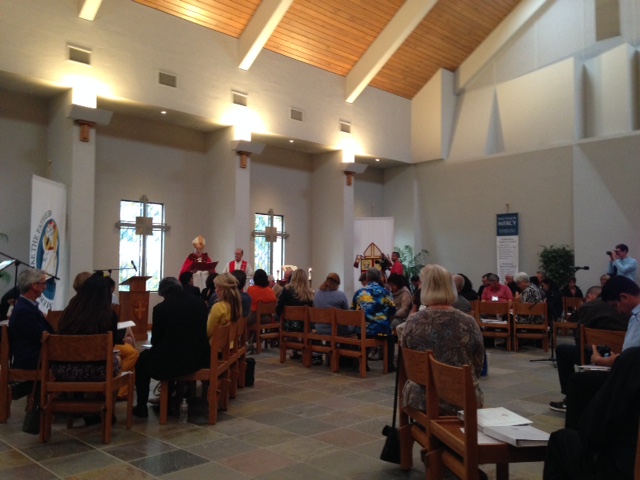

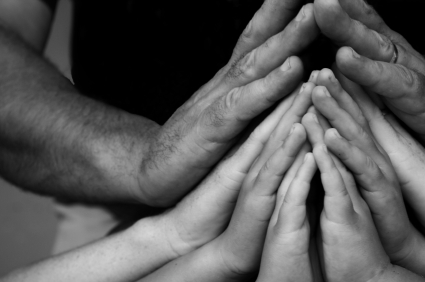
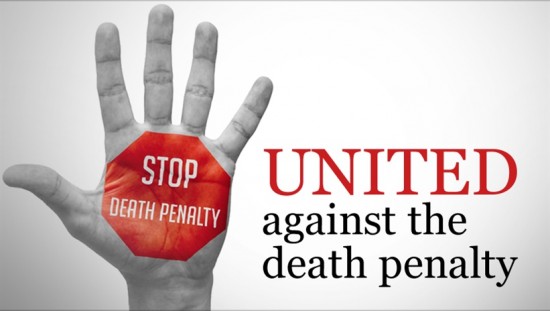

Wonderful to see a diocese holding such a synod! We need more of these.
Many Blessings